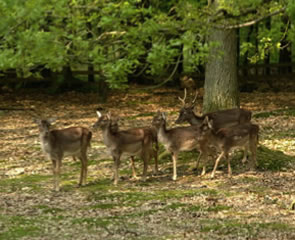Collaborative Frameworks in Land Management: A Case Study on Integrated Deer Management
 AIM: To produce a generic framework for the development of effective, informed and inclusive collaborative management to promote rural sustainability; using wild deer in the UK as a case study.
AIM: To produce a generic framework for the development of effective, informed and inclusive collaborative management to promote rural sustainability; using wild deer in the UK as a case study.
Central Questions:
- Can stakeholder collaboration enhance the efficiency with which benefits of ecological resources are captured?
- What are the barriers that hinder collaborative land management and how can they be overcome?
Specific Objectives:
- Develop a framework for collaborative management of ecological resources across different scales and levels of complexity through:
- Investigating stakeholder characteristics and goals in relation to deer management and assessing current relationships, barriers to collaboration and gaps the knowledge
- Developing novel methods for integrating ecological, economic and social knowledge and feeding this into the collaborative process. Study systems include the upland red deer systems (for example Loch Lomond and Trossachs National Park) and lowland agricultural and woodland systems (for example, the Marches Deer Project co-ordinated by the Deer Initiative).
Work programme
We have developed a programme of work that combines exciting challenges for interdisciplinary research with finding practical solutions relevant to the management of natural resources such as deer.
The involvement of stakeholders to help frame the research problem and identify key issues of concern is an essential part of the project. We will continue to discuss the results of each stage with stakeholders regularly throughout the project to inform decisions about the next stages.
Year 1
- Review of the legislation and wider ‘governance’ of deer in the UK . Review the responsibilities of government organisations and describe how these work in practice.
- Review stakeholder characteristics. Desktop study to determine the range of stakeholders at National, Regional and Local levels using published information.
- Analysis of National stakeholders through individual meetings with core National stakeholders to clarify goals and perceived relationships.
- Carry out survey of venison processors through National and Regional interviews (see progress update below).
- Analysis of local stakeholders at case study sites through interviews and workshops.
- Meet with venison suppliers.
Year 2
- Carry out a series of focus groups to investigate the role of deer in tourism.
- Hold workshops to investigate consumer preferences for wild venison.
- Carry out ecological surveys of deer impacts, people’s perceptions of this and the role of deer in shaping the landscape.
- Model deer population changes and possible economic outputs.
- Survey public attitudes to deer.
Year 3
- Methods to resolve issues identified in the first two years will be tested in the case study sites.
- The lessons we learn from investigating deer management will be used to see how well they apply to the management of other natural resources where multiple management objectives exist.
|
Updated: 23 Jan 2024, Content by: JI
|









